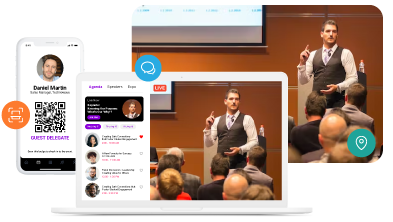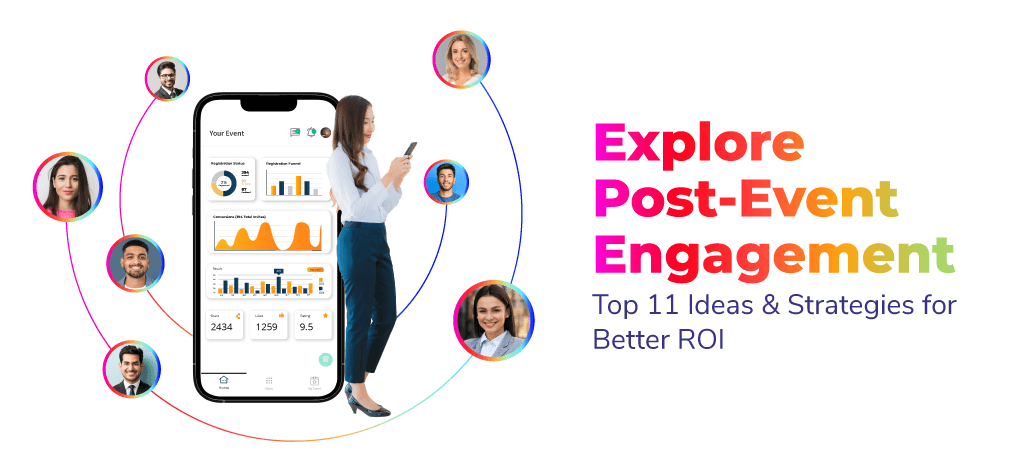Every event is unique in its own way, although all serve different purposes, objectives, and goals. To measure all the Key Performance Indicators (KPIs) it is essential to indulge the audience with post-event engagement activities. Besides that fact, it is also one of the critical aspects that determines the success and long-term impact of an event. Also, to ensure that after events to maintain relationships, the conversation needs to keep going and post-event management is one of the strategies to follow. Here in this blog, we are going to explore the diverse value proposition ideas and strategies to achieve a better ROI not just in terms of money but for customer satisfaction and other key objectives to fulfill. So, let’s deeper into understanding all of those, but before that let’s first start with the basics;
Table of Contents
Importance of Post-Event Engagement
The post-event is the cornerstone of every event that serves as the bridge between the attendees, host, and exhibitors. The first and foremost importance lies in the opportunity that it offers. It allows the host to extend the value of their event beyond the timings while reinforcing key messages, and set-ups a continued interaction. Undoubtedly, it is certain that without effective post-event engagement strategies, the organizers risk losing the connections made during the event. Additionally, there is a huge chance that they will also miss out on valuable feedback, and fail to capitalize on opportunities for further engagement and conversion. Here are some of the benefits anyone can leverage by implementing post-event engagement activities.
Retention of Attendee Interest: The first and foremost advantage of it is that it helps maintain the interest and enthusiasm of attendees. Also, it keeps them connected to your event, the host brand, and the theme or organization long after the event concludes.
Feedback and Insights: Once the event is over, engaging attendees enables hosts to gather valuable feedback and insights. This overall helps in assessing the success of the event, identifying areas for improvement, and tailoring future offerings to better meet attendees’ needs and preferences.
Relationship Building: By continuing the conversation with attendees, brands can establish relationships, build trust, and position themselves as thought leaders in their industry.
Conversion Opportunities: For the exhibitors, brands, and sales people, it is one of the greatest opportunities to generate leads, sales, or retention. By maintaining on-going communication and delivering value-added content. The organizers can drive conversions and increase their ROI.
What Hosts Miss Without Good Post-Event Engagement Strategies
Without effective post-event engagement strategies in place, hosts risk missing out on several key benefits and opportunities:
Loss of Momentum: If there is no strategy for sustained engagement, the momentum generated during the event may go away quickly. This will result in a missed opportunity to capitalize on attendee interest and enthusiasm.
Limited Feedback: Without actively seeking feedback from attendees post-event. There are high chances that hosts may miss valuable insights and opportunities for improvement. Furthermore, this puts down the ability of organizers to improve future events and enhance attendee satisfaction.
Diminished Brand Visibility: Failing to engage attendees post-event may result in diminished brand visibility and awareness, as opportunities to reinforce brand messaging and maintain top-of-mind awareness are lost.
Reduced ROI: Ultimately, the absence of effective post-event engagement strategies can lead to reduced ROI, as hosts fail to leverage the full potential of their event investments to drive long-term relationships, conversions, and business outcomes.
Top 11 Strategies for Post-Event Engagement
Now that we understand the importance of post-event engagement and the consequences of neglecting it. It is the best time to explore the 11 effective strategies for post-event engagement to deploy that drives better ROI:
1. Personalized Follow-Up Emails
The first point of contact to all your attendees post events is the message you do for follow up. It can be via email, text or simply WhatsApp. But emails sound more professional to express gratitude, share highlights, and provide relevant resources. Based on the analytics of interest of the attendees it can be personalized using the Event CRM tools. As in the modern day age the personalization improves the chances that participants engage and surely appreciate the efforts made.
2. Interactive Webinars or Workshops
Depending upon the theme of your event or subjects it addresses, it can be a good approach to host interactive webinars or workshops. These sessions can consist of in-depth discussions, case studies, or practical tips related to event topics. For example; invite the industry experts or speakers to such sessions and encourage attendee participation through live Q&A sessions or interactive polls. To maximize the webinar’s success make sure it should be engaging and highly interactive. So, leverage the power of an advanced webinar platform that offers robust features beyond chat, breakout rooms, screen sharing and customisations.
3. Exclusive Content Access
Offer attendees exclusive access to additional content or resources related to event themes or sessions. This could include bonus materials such as; extended recordings, or curated content libraries accessible only to event attendees. These extra offerings add value and incentive for continued engagement.
4. Social Media Engagement Campaigns
It is a common scenario that most of the brands and organizations nowadays have their social media accounts. So, in the same context most of the participants do have. In order to create a long-term relationship, launching social media campaigns is a good strategy. But launching campaigns does not mean engagements. So, encourage participants to share their experience, upload their event photos and pics. Besides that as an host put the event highlights on the social media handles using #hashtags followed by trending hashtags. Actively engage with user-generated content to foster community and amplify reach.
5. Online Discussion Forums or Groups
Events are meant for building a sense of community within the participatory audience to people of the same interest. By creating an online discussion forum or group over any platform where each one can share their thoughts or engage in conversations. It could be a great initiative as such a community provides a chance to ask questions, and share insights post-event. Encourage the participants to facilitate discussion around the event topics, industry trends, or related interests.
6. Surveys and Feedback Sessions
Every detail of the event is important from the registration and ticketing platform to the check-in process. By sending unique surveys like multiple-choice based questions to gather feedback on event content, format, logistics, and overall experience. This could help in getting the best outcomes, as it would give the exact insights into attendees choices. Like which part of your planning is mostly liked or disliked, leverage this information to improve your future plannings.
7. Virtual Networking Opportunities
It is not always necessary to host in-person or physical events as post-event it can also be good to host an virtual event. This can be simply a virtual gathering where the host can give chance to the participants with networking opportunities to connect with speakers, sponsors, and fellow participants. Conduct virtual meetups, networking sessions, or online coffee chats to foster meaningful connections and collaboration beyond the event. For this a robust, and highly functional virtual event platform is indeed needed.
8. Gamification and Challenges
Introduce gamification elements or challenges to incentivize ongoing engagement and participation. Create post-event challenges, quizzes, or contests related to event content or themes, with rewards or prizes for active participants to encourage continued interaction.
9. Thought Leadership Content Series
Launch a thought leadership content series post-event, featuring insights, articles, or interviews with event speakers, industry experts, or thought leaders. Share valuable perspectives, trends, and best practices to keep attendees informed and engaged with relevant content.
10. Partner Collaborations and Co-Branding
Collaboration and partnerships with co-brands to industry experts is one of the best things. Around the globe many brands do such collaborations to host joint webinars, or cross-promotional campaigns. Utilize this post event engagement strategy to partner networks and resources to extend reach and engagement while offering valuable resources to attendees.
11. Continuous Communication and Relationship Building
Every event does have registrations or even some have ticketing too. So, when anyone registers themselves, it means they are sharing their communication information as well. Use this data to set-up a communication bridge by sending regular updates, newsletters, or email campaigns. Besides that, keep your attendees informed and share relevant content based on their preferences to sustain engagement over time.
Summing Up
For sure by implementing these 11 strategies mentioned. The event organizers can effectively engage attendees post-event, drive continued interaction and value. Moreover, this will maximize the ROI of your events. Every strategy is valuable as it offers unique opportunities to foster relationships, gather feedback, and provide ongoing value to attendees. At the end, this ensures that the event’s impact extends far beyond its initial duration. If you are also one of the event hosts and look forward to deploying tools like; Event CRM, WhatsApp automation and other post event management tools. Dreamcast got your back. Book your free demo and explore the wide range of other crucial aspects of how these tools and solutions can help you maximize your event success.
Create an Extraordinary Event Experience
Across All Event Formats





















